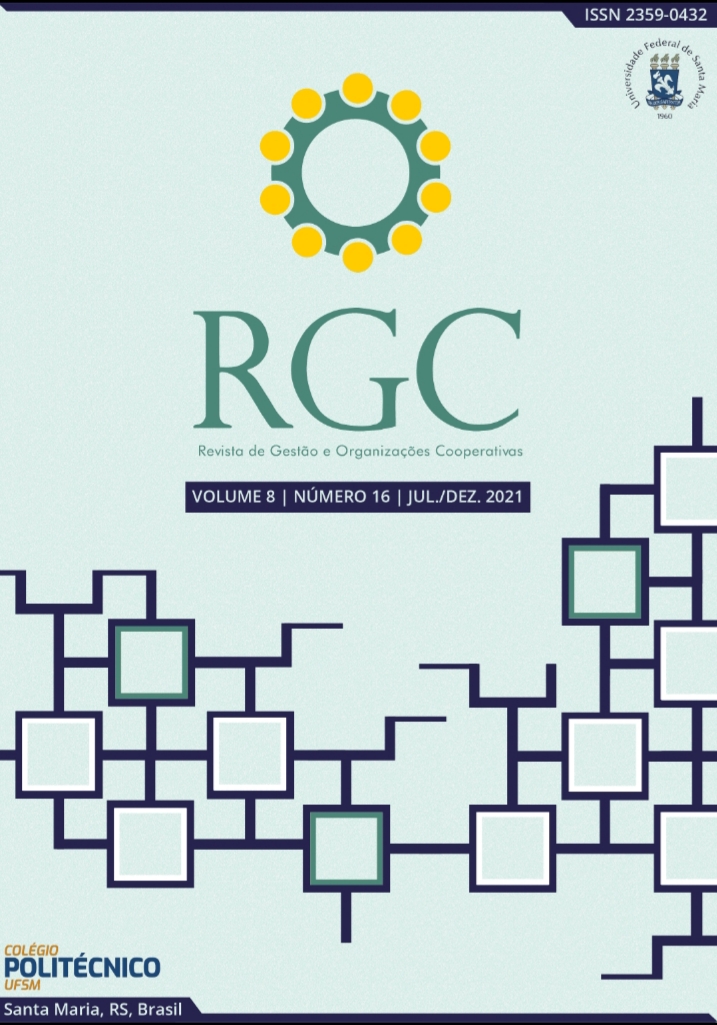What the mission statements of Rio Grande do Sul cooperatives tell us?
DOI:
https://doi.org/10.5902/2359043244104Keywords:
mission, cooperatives, qualityAbstract
This research aimed to identify which are the most used words in the mission statements of cooperatives operating in the state of Rio Grande do Sul. This is a descriptive study of a qualitative nature. For this, we used the websites of cooperatives registered in the Ocergs-Sescoop/RS System. After a detailed verification, we identified 162 cooperatives (37% of the researched population) able to compose the study sample. As a result, it was found that the most widely used (in the infinitive) verbs to initiate the mission statements are promote, generate, and offer (verified in 34 statements) and that the most cited words are quality, development and services (with 38, 35 and 30 occurrences, respectively). Still in relation to the word quality, it was possible to identify its use in two different contexts: first, related to the provision of high-level products/services, and second, related to concern for stakeholder well-being (quality of life).
Downloads
References
AINI, Y. M.; HAFIZAH, H. A. K., ZURAINI, Y. Factors affecting cooperatives’ performance in relation to strategic planning and members’ participation. Procedia – Social and Behavioral Sciences, v. 65, n. 3, p. 100-105, 2012.
BARRET, R. The values-driven organization: unleashing human potential for performance and profit. Abingdon: Routledge, 2014.
BIALOSKORSKI NETO, S. Gestão do agribusiness cooperativo. In: BATALHA, M. O (Org). Gestão Agroindustrial. São Paulo: Atlas, 1997.
BRACARENSE, P. A. Estatística aplicada às ciências sociais.Curitiba: IESDE Brasil, 2012.
BRASIL. Lei n. 5.764, de 16 de dezembro de 1971. Define a política nacional de cooperativismo, institui o regime jurídico das sociedades cooperativas e da outras providencias. Brasília, DF. Disponível: http://www.planalto.gov.br/ccivil_03/LEIS/L5764.HTM. Acesso em: 10 fev. 2020.
CROTTY, M. The foundations of social research: meaning and perspective in the research process. California: SAGE Publications Ltd, 1998.
DAYCHOUM, M. 40 ferramentas e técnicas de gerenciamento. São Paulo: Brasport, 2007.
EKPE, E. O., ENEH, S. I., IINYANG, B. J. Leveraging organizational performance through effective mission statement. International Business Research, v. 8, n. 9,p. 135-141. DOI: 10.5539/ ibr.v8n9p135, 2015.
EVANS, J. R., LINDSAY, W. M. Managing for quality and performance excellence. Mason: Thompson, 2008.
GRESSLER, L. A. Introdução à Pesquisa: Projetos e Relatórios. São Paulo: Loyola, 2004.
GURLEY, D. K., PETERS, G. B., COLLINS, L., FILFOLT, M. Mission, vision, values, and goals: an exploration of key organizational statement and daily practice in schools. Journal of Educational Change, v. 16, n. 3, p. 217-242, 2015.
HENTSCHEL, M., KETTER, W., COLLINS, J. Renewable energy cooperatives: facilitating the energy transition at the Port of Rotterdam. Energy Policy, v. 121, n. x, p. 61-69, 2018.
KAPANEVA, I. M. Left in the Dust: employee constructions of mission and vision ownership. International Journal of Business Communication, v. 56, n. 1, p. 122-145, 2019.
KUAZAQUI, E., LISBOA, T. C., GAMBOA, M. Gestão estratégica para a liderança em empresas de serviços privadas e públicas. São Paulo: Nobel, 2005.
MACDONALD, T., WALLACE, G., MACPHERSON, I. Co-operative enterprise: building a better world. Sarasota: First Edition Design Publishing, 2013.
OLIVEIRA, O. J. Gestão da qualidade: introdução à história e fundamentos. In: OLIVEIRA, O. J. Gestão da qualidade: tópicos avançados. São Paulo: Thompson, 2003.
PUUSA, A., MÖNKKÖNEN, N, K., VARIS, A. Mission lost? Dilemmatic dual nature of co-operatives. Journal of Co-operative Organization and Management, v. 1, p. 6-14, 2013.
SABRAUTZKI, S. Strategies, mission, vision, goals. Norderstedt: GRIN Verlag, 2009.
SALDAÑA, J., OMASTA, M. Qualitative research: analysing life. Singapore: SAGE Publications, Inc, 2018.
SANT’ANNA, A. de S., KILIMNIK, Z. M., MORAES, L. F. R. de. Antecedentes, origens e evolução do movimento em torno da qualidade de vida no trabalho. In: A. de S. SANT’ANNA, Z. M, KILIMNIK. Qualidade de vida no trabalho: abordagens e fundamentos. Rio de Janeiro: Elsevier, 2011.
SANTOS, B. N. dos. A inconstitucionalidade da cobrança do PIS e da COFINS das cooperativas de trabalho. Salvador: Press Color, 2009.
SISTEMA OCERGS-SESCOOP/RS. Ocergs Organização Cooperativa. Disponível em: http://www.sescooprs.coop.br/. Acesso em: 12 fev. 2020.
SONI, A. K., SALUJA, H. P. S. A study on human resource development in cooperatives. International Journal of Human Resource Management and Research, v. 3, n. 1, p. 63-72, 2013.
TERCIOTTI, S. H., RICINO, L. Redação na prática: um guia que faz a diferença na hora de escrever bem. São Paulo: Saraiva, 2012.
VALIM, R. Como elaborar seu plano de negócios: um guia para empreendedores e estudantes de Administração e Marketing. Letra Certa, 2014.
VILAS BOAS, A. A., ANDRADE, R. O. B. de. Gestão estratégica de pessoas. Rio de Janeiro: Campus/Elsevier, 2008.
VITTE, C. de C. S.; et al. Novas abordagens de desenvolvimento e sua inserção na gestão das cidades. In: KEINERT, T. M. M; KARRUZ, A. P. Qualidade de vida: observatórios, experiências e metodologias.São Paulo: Annablume, 2002.
WALLACE, E. C. The three-dimensional leader: negotiating your mission, resources and context. Oklahoma: Tate Publishing, 2009.
Downloads
Published
How to Cite
Issue
Section
License
Copyright (c) 2021 Daniel Luís Arenhardt, Eugênio de Oliveira Simonetto, Cristiano Lanza Savegnago

This work is licensed under a Creative Commons Attribution-NonCommercial-ShareAlike 4.0 International License.
Authors who publish in this journal agree to the following terms:
- Authors retain copyright and grant the journal the right of first publication, with work simultaneously licensed under the Creative Commons Attribution License that allows the sharing of work with acknowledgment of authorship and initial publication in this journal.
- Authors are authorized to enter additional contracts separately for non-exclusive distribution of the version of the work published in this journal (eg, publishing in institutional repository or as a book chapter), with acknowledgment of authorship and initial publication in this journal.
- Authors are allowed and encouraged to post and distribute their work online (eg, in institutional repositories or on their personal page) at any point before or during the editorial process, as this can bring about productive change as well as increase impact and impact. citation of published work (See The Effect of Free Access).







